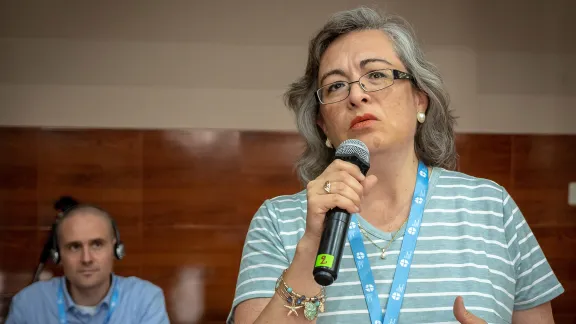
Rev. Angela Trejo Haager of the Mexican Lutheran Church, one of the coordinators of the LWF Women and Gender Justice Network of churches in Latin America and the Caribbean. Photo: LWF/A.Danielsson
LWF’s network of women in Latin America and the Caribbean provide hope through reflections on pandemic
(LWI) - Women in ordained ministry across Latin America and the Caribbean are sharing biblical reflections to support members of their communities and shed light on their work for gender justice at this time of pandemic. The ongoing series of bible studies, re-reading Old and New Testament stories through a contemporary feminist lens, began in the spring as most countries across the region went into strict lockdown to prevent the spread of the COVID-19 virus.
With people confined to their homes, church leaders worked to find new ways of connecting to parishioners and offering hope to women in increasingly difficult situations. The Women and Gender Justice Network of churches in Latin America and the Caribbean (LAC) belonging to the Lutheran World Federation (LWF) began to share short reflections that could be used by individuals and by women’s groups meeting online for study and prayer.
Drawing on feminist biblical hermeneutics that have been developed over recent decades to help combat injustice and violence against women, the reflections are rooted in the everyday experiences of women working in their local Lutheran communities. The bible studies are available in Spanish, Portuguese and English on the LWF LAC website and are intended to be shared as widely as possible for use across the region and beyond.
Rising economic injustice
The first reflections were presented by two of the network coordinators, Rev. Angela Trejo Haager of the Mexican Lutheran Church, on the story of Elisha and the widow’s oil, and by Rev. Ofelia Davila Llimpe from the Lutheran Church of Peru, on the parable of the workers in the vineyard. Both of them use the texts to reflect on the rising economic injustices facing women as a consequence of the global pandemic.
Another bible study, written by Rev. Marcia Blasi of the Evangelical Church of the Lutheran Confession in Brazil to mark Mothers’ Day, asks how the story of Jesus and Syrophoenician woman relates to mothers struggling to feed their sick or hungry children amid today’s deepening financial crisis.
A further three reflections, published on 3 June, offer contemporary insights into Jesus’ visit to the house of Martha and Mary, the parable of the Good Samaritan and the Genesis story of Abram and his wife Sarai. They are presented by Rev. Mariela Pereyra of the United Evangelical Lutheran Church in Argentina, Rev. Karen Ninnette Castillo of the Augustinian Lutheran Church of Guatemala and LWF Council member Rev. Karla Steilmann of the Evangelical Church of the River Plate in Argentina.
Stigma, sickness and healing
A recent reflection by Rev. Hanna Schramm, the first woman to be ordained into the Lutheran Church in Chile, explores the themes of stigma, sickness and healing through the story of Jesus’ encounter with the bleeding woman. There are “still a lot of taboos here around topics regarding women’s bodies,” Pastor Schramm says, but these days women “are starting to talk about the suffering they have experienced, like the bleeding woman, at the hands of the health system.”
Members of the Evangelical Lutheran Church of the Redeemer parish, where she normally leads services in German and Spanish, are cautious about re-opening after more than five months of quarantine. Rev. Schramm shares some of the challenges that women like her currently face as they seek to balance the demands of work with childcare and family commitments. Raising her voice to be heard over the sounds of her five-year-old twins playing in the background, she recounts how residents in her neighborhood were only allowed out twice a week at the height of the lockdown.
I try to speak with empathy, because that’s the key to opening hearts and helping people respond to the difficult situations of injustice for women here in Chile.
“It is challenging for me to support other young women at the moment,” she continues, as they “don’t have time to respond” to phone calls or emails. Her community is based in a well-off area of the capital, Santiago, where many people are “resistant to change” and “uninterested in what I am doing as a woman in ministry.” She says she is “not preaching like a feminist because they won’t like that” but she concludes: “I try to speak with empathy, because that’s the key to opening hearts and helping people respond to the difficult situations of injustice for women here in Chile.”
All the reflections in various languages (19 through the end of September) can be found on the news pages of the LAC website in Spanish and on the related social media platforms. Over the next weeks, bible studies will focus on the theme of Reformation in preparation for Reformation Day on 31 October.


